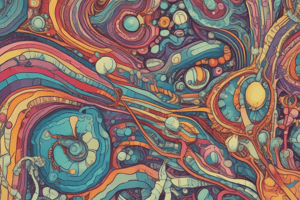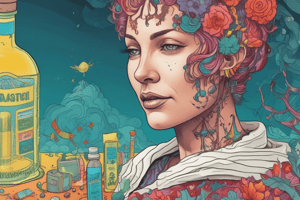Podcast
Questions and Answers
What is a drug?
What is a drug?
- A food item only.
- A chemical substance that affects the mind.
- Any substance that enters the human body and can change its function or structure. (correct)
- A smartphone application.
What is a psychoactive drug?
What is a psychoactive drug?
A chemical substance that changes one's thinking, feelings, perceptions, and behavior.
What do depressants do?
What do depressants do?
Slow down central nervous system function.
What are narcotics used for?
What are narcotics used for?
What effect do stimulants have?
What effect do stimulants have?
What are hallucinogens?
What are hallucinogens?
What are inhalants?
What are inhalants?
Define addiction.
Define addiction.
What is alcoholism?
What is alcoholism?
What is abstinence?
What is abstinence?
What is drug use?
What is drug use?
What is drug misuse?
What is drug misuse?
What defines drug abuse?
What defines drug abuse?
What is drug dependence?
What is drug dependence?
What is tolerance in relation to drug use?
What is tolerance in relation to drug use?
Define physical dependence.
Define physical dependence.
What are withdrawal symptoms?
What are withdrawal symptoms?
Flashcards are hidden until you start studying
Study Notes
Drug Concepts
- Drug: Any substance that alters the function or structure of the human body, encompassing foods, vitamins, and minerals.
Psychoactive Substances
- Psychoactive Drug: Changes body function and structure; impacts thinking, emotions, perceptions, and behavior by acting on the brain.
- Depressant: Slows down the central nervous system, induces relaxation or sleep.
- Narcotics: Powerful painkillers that induce euphoria and sedation, can lead to dependence and dangerous respiratory depression.
- Stimulants: Chemicals that accelerate central nervous system activity, leading to heightened alertness and excitability.
- Hallucinogens: Alter perception and emotions, can cause hallucinations and distorted reality.
- Inhalants: Volatile chemicals with drug-like effects when inhaled, including solvents and anesthetics.
Addiction and Substance Use Disorders
- Addiction: A chronic disorder marked by compulsive substance use causing harm in various aspects of life.
- Alcoholism: A chronic disease influenced by genetics and environment, characterized by loss of control over alcohol use, and notable denial.
- Abstinence: Choosing to avoid alcohol or drugs.
- Drug Use: Consumption within social or ritual contexts.
- Drug Misuse: Unintentional or inappropriate use causing impairment in well-being.
- Drug Abuse: Deliberate use for non-medical purposes resulting in impairment and societal issues.
Dependence and Tolerance
- Drug Dependence: Psychological and/or physical need characterized by compulsive use and withdrawal symptoms.
- Tolerance: Decreased responsiveness requiring increased intake for the same effect.
- Physical Dependence: Body's adaptation necessitating drug presence for normal functioning.
- Withdrawal: Severe physical and behavioral changes upon cessation, including insomnia, tremors, nausea, and anxiety.
Studying That Suits You
Use AI to generate personalized quizzes and flashcards to suit your learning preferences.




